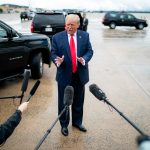President Trump’s temporary halt on the 25% tariffs on Mexico has sparked a whirlwind of reactions in Arizona, a state that heavily relies on its southern neighbor for trade. On the surface, it appears to be a diplomatic maneuver, but underneath lies a web of border security and economic manipulation that has conservative pundits chuckling and shaking their heads simultaneously.
In a classic deal reminiscent of a high-stakes poker game, Trump and Mexican President Claudia Sheinbaum Pardo reached a mutual agreement: Mexico would deploy 10,000 troops to secure the border in exchange for a one-month reprieve on those hefty tariffs. To many, this seems like a win-win situation where America’s demands for safety and security edge out the rampant flow of fentanyl and other drugs crossing the border, not to forget the criminal activity accompanying it.
Trump's tariff standoff looms big in Arizona, whose biggest international trading partner is Mexico https://t.co/7mFIzxM5c8
— Just the News (@JustTheNews) February 4, 2025
Supporters of Trump’s tariff policies tout them as a necessary intervention. They argue that in an age where fentanyl overdose deaths are alarming, using trade pressure to stem the tide of illegal drugs is crucial. Matthew Petersen, Arizona’s Senate President, exemplifies this perspective, underscoring the practicality of tariffs as a means to protect American interests. For Petersen, this temporary adjustment is merely a strategic tool employed by Trump to foster not just economic benefits but also the safety of Arizonans amid the chaos of illegal immigration that costs the state billions every year.
In contrast, those opposed to these tariffs, such as Governor Katie Hobbs, seem to view them through a doomsday lens. She described them as a new “tax” that will send grocery and gas prices skyrocketing while threatening the livelihoods of Arizona workers in critical sectors. Somehow, one could get the impression that Hobbs believes that without these tariffs, life in Arizona would go on unscathed, which ignores the ongoing border crisis. The prospect of construction and safeguard measures in exchange for economic adjustments appears to be an alien concept in her reasoning.
While it’s hard to take the complaints of Democratic leaders seriously when they showcase their economic “concerns,” it’s equally astonishing to consider how tariffs, which are designed to stabilize and protect American economic interests, are painted as a hindrance. With agriculture and food being paramount to trade with Mexico—a trade worth about $20 billion annually—losing sight of national security for a brief period of heightened costs seems rather shortsighted.
At the end of the day, the debate surrounding tariffs and border security is less about numbers on balance sheets and more about the principle of putting Americans first. The tariffs may be temporary, but the underlying issues remain; Arizonans are rightfully questioning whether keeping criminality and drugs at bay is worth the risk of a slight uptick in local prices. With the new deal in place, the people in Arizona might just find out that protecting their state and their interests takes precedence over fleeting economic complaints.




